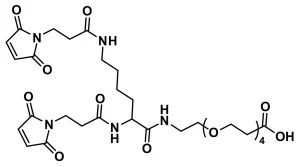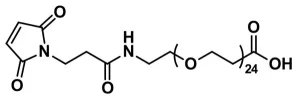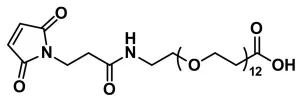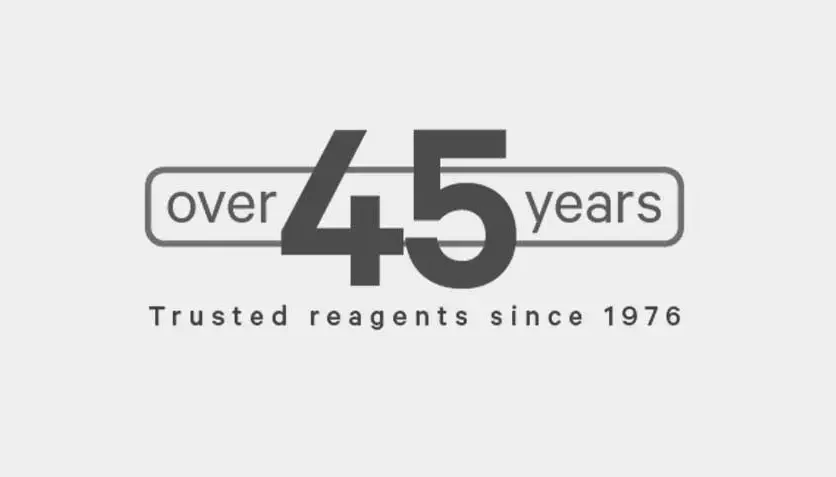MAL-dPEG®2-TFP ester, product number QBD-10549, is a crosslinking reagent that joins free amines to free thiols (sulfhydryl groups) across a short (16 atoms), single molecular weight, discrete PEG (dPEG®) linker. The sulfhydryl groups react with a maleimido group via a Michael addition reaction. The amines form amide bonds with the crosslinker by nucleophilic substitution of the 2,3,5,6-tetrafluorophenyl (TFP) ester of the terminal propionic acid group.
The conjugation of free amines to free thiols is one of the most popular, most useful crosslinking reactions in bioconjugate chemistry is the conjugation of free amines to free thiols. These reactions require heterobifunctional reagents that bridge the two groups. Typical crosslinkers are hydrophobic. Vector Laboratories’ dPEG® crosslinking products are water-soluble, amphiphilic, single molecular weight PEG compounds with discrete chain lengths. These hydrophilic, non-immunogenic, dPEG® crosslinkers prevent the problems with aggregation that arise when using traditional, hydrophobic crosslinkers.
Published studies have shown that TFP esters are more hydrolytically stable in aqueous buffers than N-hydroxysuccinimidyl (NHS) esters and are more reactive toward free amines. TFP esters react under the same conditions as NHS esters. However, the optimal pH range for TFP esters (7.5 – 8.0) is slightly higher than for NHS esters (7.0 – 7.5). Amide bond formation between the TFP-activated propionic acid group of MAL-dPEG®2-TFP ester and a free amine will be slightly slower at a suboptimal pH compared to the reaction rate within the optimum pH range.
The maleimide end of MAL-dPEG®2-TFP ester, product number QBD-10549, reacts optimally with a sulfhydryl at pH 6.5 – 7.5. Conduct the conjugation at the lowest reasonable pH within this range. Above pH 7.5, free amines compete with free thiols at the maleimide reaction site, which may confound the data. Moreover, at higher pH values, the maleimide ring may open to form unreactive maleamic acid.
MAL-dPEG®2-TFP ester, product number QBD-10549, can be used the same way and in the same applications as the equivalent NHS esters. Possible uses for this product include the following:
Coating nanoparticle surfaces;
Tethering antibodies to atomic force microscopy (AFM) probes;
Constructing antibody-drug conjugates (ADCs);
Adding flexibility and water solubility to a peptide;
Increasing the water solubility and hydrodynamic volume of hydrophobic biomolecules;
Building supramolecular constructs; and,
Conjugating the TFP ester end of the molecule a liposomal surface and then using the free maleimide end of the molecule to attach a small molecule drug, peptide, or antibody for targeted delivery of a diagnostic or therapeutic package.
| Unit Size | 100mg, 1000mg |
|---|---|
| Molecular Weight | 476.38; single compound |
| Chemical formula | C₂₀H₂₀F₄N₂O₇ |
| CAS | N/A |
| Purity | > 98% |
| Spacers | dPEG® Spacer is 16 atoms and 17.3 Å |
| Shipping | Ambient |
| Typical solubility properties (for additional information contact Customer Support) | Methylene Chloride, DMSO, DMAC, DMF, Methanol or Acetonitrile. |
| Storage and handling | -20°C; Always let come to room temperature before opening; be careful to limit exposure to moisture and restore under an inert atmosphere; stock solutions can be prepared with dry solvent and kept for several days (freeze when not in use). dPEG® pegylation compounds are generally hygroscopic and should be treated as such. This will be less noticeable with liquids, but the solids will become tacky and difficult to manipulate, if care is not taken to minimize air exposure. |
Greg T. Hermanson, Bioconjugate Techniques, 3rd Edition, Elsevier, Waltham, MA 02451, 2013, ISBN 978-0-12-382239-0; See Chapter 18, Discrete PEG Reagents, pp. 787-821, for a full overview of the dPEG® products.
Applicable patents and legal notices are available at legal notices.




Stay in the Loop. Join Our Online Community
Products
Ordering
About Us
Application
Resources

©Vector Laboratories, Inc. 2025 All Rights Reserved.
To provide the best experiences, we use technologies like cookies to store and/or access device information. Consenting to these technologies will allow us to process data such as browsing behavior or unique IDs on this site. Not consenting or withdrawing consent, may adversely affect certain features and functions. Privacy Statement
How do I Request a Quote?
To request a quote for products: